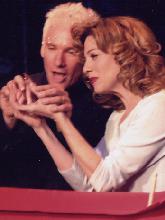SEARCH CurtainUp
REVIEWS
FEATURES
NEWS
Etcetera and
Short Term Listings
LISTINGS
Broadway
Off-Broadway
BOOKS and CDs
OTHER PLACES
Berkshires
London
LA/San Diego
Philadelphia
Elsewhere
QUOTES
On TKTS
LETTERS TO EDITOR
FILM
LINKS
MISCELANEOUS
Free Updates
Masthead
NYC Weather
A Comfortable Truth
By Laura Hitchcock

Paul Lieber & Pamela Gordon
(Photo: Nina Via) |
But it's not only the priests who abuse children here. Kemble also takes a swipe at the therapist as lackey, whose determination to smooth things over so that all concerned are presented with a comfortable truth gives the play its title. And it's not only children who are the targets of priestly abuse in the form of Father Grant (Paul Lieber). He seduces Pamela behind a clothesline, perhaps as a diversion which succeeds in persuading her that Father Grant likes women and is no threat to her son Thomas (Zack Graham). Father Grant also teases out the repressed homosexuality in Thomas's father Ray (Greg Mullavy), perhaps insuring that he'll keep his mouth shut.
Dr. Cunningham's role is to put the Gordon family and the priest under hypnosis in his search for truth, delete the disturbing and sculpture the comfortable. On the surface, Father Grant is mild-mannered and doesn't remember ever touching 11-year-old Thomas; the Gordons also laugh sardonically and deny that such a nice man could do such a thing; Thomas, now 22, has big plans to sue everybody, including the Church for what it did under the Spanish Inquisition in 1492.
Under hypnosis, asked to define "Love", Ray sings the Marine Corps Hymn. Pamela's definition is a wordless scream. Asked to define "Jesus", Father Grant explodes with rage and cynicism, screaming that Jesus didn't ask to be crucified. Thomas, sees Jesus as a figure of purity and love defined by the early church before it became an institution reeking with power figures. It's the play's one truly spiritual moment.
Grant is suspicious of psychoanalysis, defining it as confession without absolution, but reluctantly agrees to strap on a penile lie detector so that his reactions can be measured. Thomas, leader of a rock band, puts it in his own idiom, "Eat my brains, puke 'em up!"
The vividly depicted act of abuse is appalling and the violence that follows understandable, as is the mother's final confession to her son that she didn't listen to what he told her because she was afraid of "them." Her assorted bandages imply that she was beaten by her husband but her sardonic persona seems at odds with that.
As a director, Kemble shines. The set, a dark jumble shop like Yeats' "foul rag-and-bone shop of the heart", personifies the inner turmoil. A Greek chorus of choir boys and girls who not only chant but throw props down from above add a subtext, a reminder of the innocence that is always there watching with haunted eyes. One of the play's most powerful moments comes at the end when they gather Thomas in their arms like a Pieta.
Graham has the pain-racked fierceness of the tortured Thomas and Mitchell matches him in a role ranging from the young impressionable housewife to the bitter repressed woman. Her agonized moments of truth under hypnosis are devastating. Paul Lieber is remarkable as he presents the mousy priest behind which lurks a raging tiger and a soul in torment. Mullavey is a good-ol-boy Marine rimmed with lust and violence. Blumenfeld has the wisdom to play the doctor as bland and kindly. His evil genius is his willingness to make the world over into his own image.
|
A COMFORTABLE TRUTH Playwright/Director: Mark Kemble Cast: Alan Blumenfield (Dr. Cunningham), Zack Graham (Thomas Gordon), Paul Lieber (Father Grant), Shareen Mitchell (Pamela Gordon), Greg Mullavey (Ray Gordon). Choir: Burkni Birgisson, Chris Blasman, Korbin James, Andrea Jajeh, Mirjam Novak, Hunter Wood. Set Design: Juan Carlos Malpeli Lighting Design: Ryan Bourne Costume Design: Jean Lee Running Time: Two and a half hours, One 15-minute intermission Running Dates: January 24-February 22, 2004 Where: Lee Strasberg Creative Center, 7936 Santa Monica Blvd., West Hollywood, Contact: (323) 650-7777 Reviewed by Laura Hitchcock on.January 24. |

At This Theater

Leonard Maltin's 2003 Movie and Video Guide

Ridiculous!The Theatrical Life & Times of Charles Ludlam

Somewhere For Me, a Biography of Richard Rodgers

The New York Times Book of Broadway: On the Aisle for the Unforgettable Plays of the Last Century

6, 500 Comparative Phrases including 800 Shakespearean Metaphors by CurtainUp's editor.
Click image to buy.
Go here for details and larger image.



